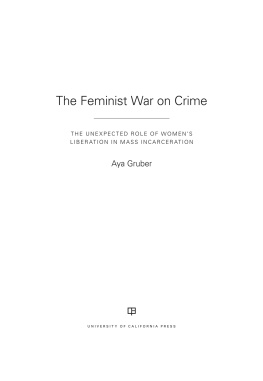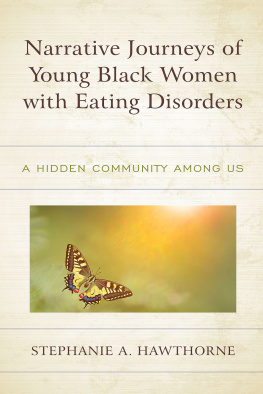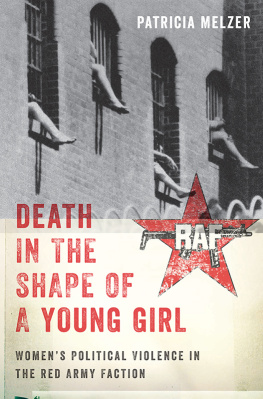Young Womens Carceral Geographies
EMERALD STUDIES IN CRIMINOLOGY, FEMINISM AND SOCIAL CHANGE
Series Editors:
Sandra Walklate, School of Social Sciences, Monash University, Australia.
Kate Fitz-Gibbon, School of Social Sciences at Monash University and Monash Gender and Family Violence Prevention Centre, Australia.
Jude McCulloch, Monash University and Monash Gender and Family Violence Prevention Centre, Australia.
JaneMaree Maher, Centre for Womens Studies and Gender Research Sociology, Monash University, Australia.
Emerald Studies in Criminology, Feminism and Social Change offers a platform for innovative, engaged, and forward-looking feminist-informed work to explore the interconnections between social change and the capacity of criminology to grapple with the implications of such change.
Social change, whether as a result of the movement of peoples, the impact of new technologies, the potential consequences of climate change, or more commonly identified features of changing societies, such as ageing populations, intergenerational conflict, the changing nature of work, increasing awareness of the problem of gendered violence(s), and/or changing economic and political context, takes its toll across the globe in infinitely more nuanced and interconnected ways than previously imagined. Each of these connections carry implications for what is understood as crime, the criminal, the victim of crime, and the capacity of criminology as a discipline to make sense of these evolving interconnections. Feminist analysis, despite its contentious relationship with the discipline of criminology, has much to offer in strengthening the discipline to better understand the complexity of the world in the twenty-first century and to scan the horizon for emerging, possible or likely futures.
This series invites feminist-informed scholars, particularly those working comparatively across disciplinary boundaries to take up the challenges posed by social change for the discipline of criminology. The series offers authors a space to adopt and develop strong, critical personal views whether in the format of research monographs, single or co-authored books, or edited collections. We are keen to promote global views and debates on these issues and welcome proposals embracing such perspectives.
Forthcoming titles in this series
Carceral Feminicidio: The Disappearance of Indigenous Women into Prisons Gillian Balfour
Young Womens Carceral Geographies: Abandonment, Trouble and Mobility
BY
ANNA SCHLIEHE
University of Cambridge, UK
United Kingdom North America Japan India Malaysia China
Emerald Publishing Limited
Howard House, Wagon Lane, Bingley BD16 1WA, UK
First edition 2021
Copyright 2021 Anna Schliehe. Published under exclusive licence by Emerald Publishing Limited
Reprints and permissions service
Contact:
No part of this book may be reproduced, stored in a retrieval system, transmitted in any form or by any means electronic, mechanical, photocopying, recording or otherwise without either the prior written permission of the publisher or a licence permitting restricted copying issued in the UK by The Copyright Licensing Agency and in the USA by The Copyright Clearance Center. Any opinions expressed in the chapters are those of the authors. Whilst Emerald makes every effort to ensure the quality and accuracy of its content, Emerald makes no representation implied or otherwise, as to the chapters suitability and application and disclaims any warranties, express or implied, to their use.
British Library Cataloguing in Publication Data
A catalogue record for this book is available from the British Library
ISBN: 978-1-83909-050-9 (Print)
ISBN: 978-1-83909-049-3 (Online)
ISBN: 978-1-83909-051-6 (Epub)
This book is written in loving memory of:
Georg Schliehe
19402015
for inspiring me and teaching me a deep interest in the world and always reminding me of the importance of critical thought, emancipation and kindness
and
Mike Laxton
19352014
for inspiring this project and encouraging me right to the end
Contents
List of Tables, Figures and Maps
Table
Figure
Map
Acknowledgements
The list of thanks is long, and I am grateful and indebted to a large number of people for their continued guidance and support and for adding their voices to this book in one way or another. This research would not have been possible without the generous financial support from the Urban Studies Foundation.
A particular thanks to my PhD supervisors Chris Philo and Hester Parr for unwavering support, kindness and encouragement as well as reading and re-reading my work including this manuscript and providing me with thoughtful comments and kind guidance over so many years.
Thank you also to everyone at the SCCJR in Glasgow for much support, advice and always making me feel welcome at Ivy Lodge. Particular thanks to Susan Batchelor and Sarah Armstrong for years of helping me out with practical and academic advice and Sarah Anderson, Rebecca Foster, Alistair Fraser, Caitlin Gormley and Javier Velsquez Valenzuela for being such wonderful colleagues and friends a special thanks to Annie Crowley, Laura Robertson my dearest friends and colleagues for helping me improve this manuscript.
I also want to thank my current colleagues at the Prison Research Centre in Cambridge for their continued support and inspiration and a special thanks to my COMPEN team members, Ben Crewe, Alice Ievins, Julie Laursen and Kristian Mjland for helping me with this manuscript and also your general support, kindness and inspiration your friendship means a lot. A particular thanks also to other colleagues far and wide, particularly Tom Disney and Ann-Karina Henriksen for their kind help with the manuscript.
Many thanks also to Dominique Moran and Jen Turner for being so accommodating and enthusiastic. It has been a pleasure to establish the Carceral Geography Working Group with you and think through, debate and write about all things carceral. I am truly grateful for your friendship and all the advice, the critical eye and many helpful comments on my work, including this manuscript.
A particular thanks goes to all the people at Up-2-Us for years of supporting my work and much guidance and help along the way: Olive Arens for making this collaboration possible and placing research at the heart of Up-2-Us, Gail Wilson for comments on my work, many chats and support; all the project workers, particularly Hayley Farrell, Carly Scott and Emma Wilson for the support and for driving around Scotland following the young womens trail. Many thanks also to Norman Clarke, Mike Laxton and Jim Watson for the introducing me to the project and explaining the Scottish system.
A big thank you to everyone at the prison, including prisoners, staff and the SPS I cannot name you here but want to warmly thank you for making this research possible and being so accommodating and welcoming. Likewise, many thanks to all the staff and young people at the secure unit, particularly everyone I interviewed for explaining their world, many cups of tea and integrating me into the routine. Even though this study is critical of incarceration, I want to acknowledge the kind, compassionate and hard-working people who try and improve young peoples lives. I sincerely hope that my work does not overshadow your efforts.







